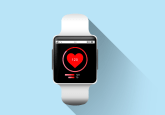Play it by ear: stroke survivors can relearn musical skills with robo-glove

Scientists have created a glove that can aid stroke recovery and teach patients how to play music or help them relearn the skill.
A team from the department of Mechanical Engineering at Florida Atlantic University (FAU; FL, USA) have demonstrated that a smart exoskeleton glove can help stroke patients re-learn manual tasks. The study showed that the glove enabled stroke survivors to have control over their movement while assisting their natural hand movements, helping patients to relearn how to play musical instruments. The team used AI to train the glove as a music teacher that would be of help with personalized rehabilitation. Stroke is a leading cause of serious disability for adults, and the rehabilitation process can be extremely physically and mentally taxing. This research may now help to ease rehabilitation and aid stroke survivors in making vital progress with key motor skills.
Worldwide, approximately 1 in 4 adults over the age of 25 will have a stroke in their lifetime. Following a stroke, the sufferer often needs to re-learn how to walk, talk or perform daily tasks. Past research has shown that music therapy can help patients rehabilitate language and motor function, however stroke survivors who can play musical instruments may need to relearn these skills.
The researchers designed and tested a lightweight ‘smart hand exoskeleton’: a multi layered, flexible 3D printed Robo-glove. Due to its flexibility, the glove can be easily custom adjusted to fit every wearer’s anatomy.
The glove fingertips contain soft pneumatic actuators that generate motion exerting a force, to mimic natural hand movements. There are also 16 flexible sensors that give tactile sensation when surfaces are touched.
“While wearing the glove, human users have control over the movement of each finger to a significant extent,” explained Erik Engeberg, a professor at FAU’s Department of Ocean & Mechanical Engineering. “The glove is designed to assist and enhance their natural hand movements, allowing them to control the flexion and extension of their fingers. The glove supplies hand guidance, providing support and amplifying dexterity.”
The researchers managed to successfully create AI that taught the glove to determine the difference between correct and incorrect versions of a song on the piano, essentially enabling the glove to function as a music teacher.
The glove can now be programmed to give feedback to the wearer while they are playing, enabling them to make improvements on their performance. Authors foresee that patients could wear the gloves to help both hands independently regain dexterity, motor skills and coordination.
This research could help patients recover by relearning music and other coordination skills. The glove could help millions of patients and allow them to rehabilitate and go back to normal life.
This research could also advance the medical field regarding stroke recovery, by making it quicker and more efficient. In the future, the research team hope to adapt the design to cover a range of teachings, for example object manipulation.





